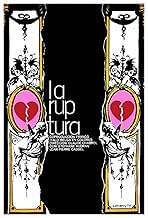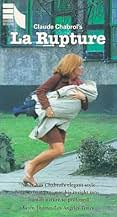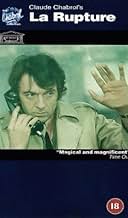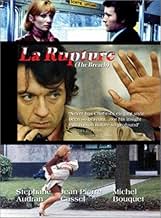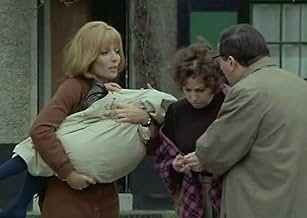Charles Régnier, père de famille toxicomane, blesse son jeune fils dans un accès de rage. Sa femme Hélène prend peur et le quitte. Désireux de récupérer, le père de Charles tente de récupére... Tout lireCharles Régnier, père de famille toxicomane, blesse son jeune fils dans un accès de rage. Sa femme Hélène prend peur et le quitte. Désireux de récupérer, le père de Charles tente de récupérer son petit-fils.Charles Régnier, père de famille toxicomane, blesse son jeune fils dans un accès de rage. Sa femme Hélène prend peur et le quitte. Désireux de récupérer, le père de Charles tente de récupérer son petit-fils.
- Réalisation
- Scénario
- Casting principal
- Récompenses
- 1 nomination au total
Margo Lion
- Mme Humbert - la première parque
- (as Margot Lion)
Avis à la une
The Breach (aka La rupture) is a film made by celebrated French director Claude Chabrol in the middle of his golden period at the turn of the 70's. Like most of his other films from this time, it is a psychological thriller that is more interested in character interactions than in suspense. While it is true that there is some of that present here too, there isn't a lot and the film only truly moves into thriller territory in its final quarter. In fact, the switch is quite jarring and has left some thinking it doesn't fit very well alongside what has gone before. I kind of liked the ending though, it isn't especially realistic and even becomes a bit surreal, yet the story on the whole has got an oddness about it generally, typified by the unsettling and somewhat off-centre musical score used throughout. The story revolves around a woman called Hélène who is the wife of a rich layabout drug addict. One day he attacks her and their child, leaving the boy hospitalised. Hélène attacks him back leaving him with a head injury. His rich father hires a sleazy friend of the family to befriend Hélène with the objective of incriminating her, leading to a divorce that would favour his son.
Like a lot of Chabrol's best works this one stars his wife, the radiant Stéphane Audran who is, once more, extremely good and sympathetic as Hélène, Jean-Pierre Cassel is also impressive as her manipulative 'friend', while it would be remiss not to mention Catherine Rouvel also, who is a lot of fun as his highly sexed girlfriend who pleasingly spends most of the film in a state of undress (ooh la la). In fact, there is a plethora of oddball side characters in this one, most live in the boarding house where the majority of the action revolves around, such as three old ladies who continually play with Tarot cards, a mentally-backwards girl and an overly-dramatic actor. On top of this, it's nicely photographed, especially in the surreal park scene towards the end where things get a little trippy. The film criticises the bourgeois, with the rich grandparents acting like it is their right to dictate events purely on account of their financial strength. But the film works mainly as an off-kilter psychological drama/thriller, underpinned by fine acting and some good direction.
Like a lot of Chabrol's best works this one stars his wife, the radiant Stéphane Audran who is, once more, extremely good and sympathetic as Hélène, Jean-Pierre Cassel is also impressive as her manipulative 'friend', while it would be remiss not to mention Catherine Rouvel also, who is a lot of fun as his highly sexed girlfriend who pleasingly spends most of the film in a state of undress (ooh la la). In fact, there is a plethora of oddball side characters in this one, most live in the boarding house where the majority of the action revolves around, such as three old ladies who continually play with Tarot cards, a mentally-backwards girl and an overly-dramatic actor. On top of this, it's nicely photographed, especially in the surreal park scene towards the end where things get a little trippy. The film criticises the bourgeois, with the rich grandparents acting like it is their right to dictate events purely on account of their financial strength. But the film works mainly as an off-kilter psychological drama/thriller, underpinned by fine acting and some good direction.
6sol-
Intent on winning custody of their grandson who their son injured while stoned, an upper class couple set out to discredit and defame their daughter-in-law in this odd thriller from Claude Chabrol. Stéphane Audran plays the daughter-in-law, however, the majority of the film is curiously not told from her point-of-view but rather the perspective of a man hired to discredit her, played by Jean-Pierre Cassel. As such, the film does derive any juice from Audran wondering whether or not she is going insane (a la 'Gaslight'), which would not necessarily be a problem, except that Cassel's schemes are so strange and convoluted that it is obvious that they will fail before he even puts them into action. His attempts to spread gossip around the boarding house where Audran is staying are fairly credible. At his most incompetent though, Cassel tries to force Audran to eat a drugged candy (!) while his most bizarre plan involves his girlfriend wearing a wig and fondling Audran's landlady's mentally challenged daughter, expecting that the girl will mistake the wigged woman for Audran! With a perfectly terse music score and lots of fluid camera movements, 'La Rupture' still remains very watchable despite the messy plot, and the LSD-induced scenes towards the end need to be seen to be believed. There is also a lot of memorable weirdness throughout, such as Cassel's girlfriend always being nude (or partially naked) and her fondling scene, complete with an X-rated Satanic film projected in a darkened room might well rate as the very strangest sequence that Chabrol ever committed to celluloid.
Of all the great films that Claude Chabrol made; The Breach is one of the most often praised, and that is not surprising at all as this film sees the great French director at the absolute top of his game and deserves every good word said about it! As ever with Chabrol, what we have here is a film that thrills on the surface but has much more going on beneath it. The characters are undoubtedly the most important thing about the film; and the director ensures that each one is brought to life effectively and believably, and this ensures that the film's many substantial points can come through. The film begins with a surreal sequence that could be something out of a zombie movie, as we see a dishevelled man emerge from the bathroom in just a robe and proceed to attack his wife Hélène. His attention soon moves on to the small boy and after putting the kid in hospital, the wife decides to file for a divorce. However, things are not so simple as her husband's father happens to be one of the richest and most powerful men in town, so he won't let Hélène take his grandson from him without a fight...and hires the immoral Paul Thomas to dig up some dirt on Hélène.
The film doesn't contain a great deal of excitement in the common thriller sense, but Chabrol keeps his audience on the edge of their seats by way of the characters and the atmosphere. The film centres on a boarding house and the people that live there; and the interaction between them makes up the bulk of the film. The main theme on display is an attack against the rich; this comes through plainly and obviously through the character of Ludovic Régnier; a man who has enough money to always get what he wants and not care about who gets trampled in the process. The outlook of the film is very bleak all round and Chabrol seems keen to show the dark side of human nature as much as possible. The central plot line, which involves a man trying to prove that an upstanding woman is an unfit mother by any means necessary, is very bleak in the way it plays out. As ever with Chabrol, the acting is excellent and he has put together a great cast here that includes his then wife and frequent muse, the beautiful Stéphane Audran in the lead role and a support cast that features superb performances from the likes of Jean-Pierre Cassel and Michel Bouquet. The film has a very unique style that fluctuates throughout; as mentioned, the first five minutes or so almost seem like something out a zombie movie and then it moves into more familiar Chabrol territory before changing again for the climax as the director gives us a very strange and striking hallucination sequence. Overall, this is an excellent thriller that comes highly recommended and I may even rate it as Chabrol's best.
The film doesn't contain a great deal of excitement in the common thriller sense, but Chabrol keeps his audience on the edge of their seats by way of the characters and the atmosphere. The film centres on a boarding house and the people that live there; and the interaction between them makes up the bulk of the film. The main theme on display is an attack against the rich; this comes through plainly and obviously through the character of Ludovic Régnier; a man who has enough money to always get what he wants and not care about who gets trampled in the process. The outlook of the film is very bleak all round and Chabrol seems keen to show the dark side of human nature as much as possible. The central plot line, which involves a man trying to prove that an upstanding woman is an unfit mother by any means necessary, is very bleak in the way it plays out. As ever with Chabrol, the acting is excellent and he has put together a great cast here that includes his then wife and frequent muse, the beautiful Stéphane Audran in the lead role and a support cast that features superb performances from the likes of Jean-Pierre Cassel and Michel Bouquet. The film has a very unique style that fluctuates throughout; as mentioned, the first five minutes or so almost seem like something out a zombie movie and then it moves into more familiar Chabrol territory before changing again for the climax as the director gives us a very strange and striking hallucination sequence. Overall, this is an excellent thriller that comes highly recommended and I may even rate it as Chabrol's best.
Like Graham Greene's so-called entertainments, this film veers into melodrama, but it never seemed unreal to me and was certainly a pleasure to watch. The highlight for me was the machinations of the lowlife hired to bring the heroine down. I also got drawn into the setting of the rooming house and the warmth of the more innocent people that give strength to the heroine. Acting, as always in a Chabrol film, is superb.
When the aspirant writer Charles Régnier (Jean-Claude Drouot), who is drug addicted and mentally ill, throws his four-year-old son Michel against the kitchen wall in a rage attack, his wife Hélène (Stéphane Audran) defends her son and herself, hitting Charles several times with a frying pan. Her neighbor takes Hélène and Michel to the hospital and the boy must be interned with a broken leg and concussion. Hélène works as bartender and has supported her family alone since her wealthy father-in-law Ludovic Régnier (Michel Bouquet) hates that Charles has married with someone uneducated from the lower classes. Hélène finds a low-budget boarding house nearby the hospital and rents a simple room to be close to her beloved son. Further, she hires a lawyer to get the divorce and the custody of Michel. Ludovic is advised by his lawyer that Hélène would win the custody and he hires the lowlife Paul Thomas (Jean- Pierre Cassel), who is totally broken and desperately needs money, to find dirt evidences against the Hélène. The vile Paul lures Hélène saying that he is very ill and moves to the boarding house. After a while, he does not find anything against Hélène, and he decides to fabricate evidences to destroy her reputation. But things do not work as planned.
I have seen many excellent films of the master of suspense Claude Chabrol, but "La Rupture" is probably the best film I have seen of this French director and a masterpiece of human cruelty and sordidness. Chabrol usually criticizes the bourgeois class in his movies, and the fight between classes is shown in "La Rupture", with a sharp demonstration of how destructive the prejudice and the power of money may be. The plot presents wealthy characters; some of them are just glanced like the actor in the boarding house but everyone has an important role in the dark story. Paul Thomas is among the most despicable villains I have ever seen, with his corrupted soul. I could write pages about this masterpiece but instead, I prefer to recommend to viewers of good taste to see it. My vote is ten.
Title (Brazil): "Trágica Seoaração" ("Tragic Separation")
Note: On 07 December 2024, I saw this film again.
I have seen many excellent films of the master of suspense Claude Chabrol, but "La Rupture" is probably the best film I have seen of this French director and a masterpiece of human cruelty and sordidness. Chabrol usually criticizes the bourgeois class in his movies, and the fight between classes is shown in "La Rupture", with a sharp demonstration of how destructive the prejudice and the power of money may be. The plot presents wealthy characters; some of them are just glanced like the actor in the boarding house but everyone has an important role in the dark story. Paul Thomas is among the most despicable villains I have ever seen, with his corrupted soul. I could write pages about this masterpiece but instead, I prefer to recommend to viewers of good taste to see it. My vote is ten.
Title (Brazil): "Trágica Seoaração" ("Tragic Separation")
Note: On 07 December 2024, I saw this film again.
Le saviez-vous
- AnecdotesClaude Chabrol once stated that the bus scene where Hélène (his wife Stéphane Audran) tells her family's story to the lawyer (Michel Duchaussoy) was the occasion when he finally thought that Stéphane had become an actress.
- Citations
Opening Title Card: [from the French] But what thick night suddenly surrounds me? JEAN RACINE
- ConnexionsReferences Les Géants de l'Ouest (1969)
Meilleurs choix
Connectez-vous pour évaluer et suivre la liste de favoris afin de recevoir des recommandations personnalisées
- How long is The Breach?Alimenté par Alexa
Détails
- Durée2 heures 4 minutes
- Mixage
- Rapport de forme
- 1.85 : 1
Contribuer à cette page
Suggérer une modification ou ajouter du contenu manquant

Lacune principale
By what name was La rupture (1970) officially released in India in English?
Répondre
